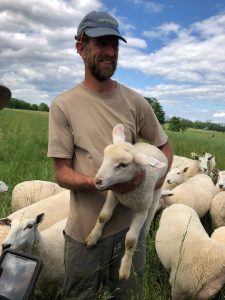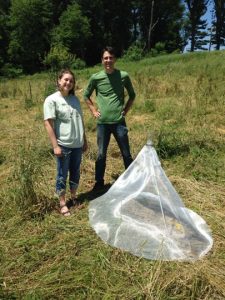Our Livestock
The Dickinson College Farm has raised three types of livestock: beef cattle, sheep, and laying hens. We are proud to provide high quality, humanely raised, and sustainable free-range meat to our community.
Beef Cattle

Our cattle are a mix of purebred Black Angus and Angus-Hereford Crosses and are raised for beef production.
The cattle are outside on pasture from April to November. In winter we feed them hay in a sheltered area or let them exercise on a winter pasture when the conditions permit. Winter manure is collected and composted for use in the organic vegetable farming operation.
Sheep

At the end of 2024, we sold our flock of sheep. For the first time in 17 years, we do not currently have sheep on the farm. In the past, our sheep were a cross between Dorsets, Leicester Longwool, Cheviots, and East Fresians. These wool sheep are easy to raise and size up well on pasture with no supplemental grain. Lambs are born from March through May.
Our sheep were raised for both wool products and meat. Male lambs are harvested for meat at 6 to 12 months of age. Females may be used for meat or as replacement ewes to build the herd. We have used mature sheep for mutton products (sausage, cubes, chops, and roasts). Our sheep were shorn at the beginning of the summer and their wool is used to make yarn, angel ornaments, dryer balls, and other value-added products.
The farm’s sheep herd is naturally parasite resistant requiring very little use of deworming products. We also practiced integrated parasite management (rotational grazing and regular health screenings) to keep the flock healthy naturally.
Rotational Grazing
We practice rotational grazing, which means that animals are moved to fresh pasture almost every day. This keeps them happy and well fed, distributes manure naturally, and builds the health of the soil in pastures and resting vegetable fields.
Veterinary Care
Our livestock are observed every day by students and farm staff in order to catch any health problems early. We care for our animals under the guidance of Dr. Ben Rhodes of Burnt Mill Veterinary Services. Medications are used only for sick or injured animals to bring them back to health. No subtherapeutic antibiotics or growth hormones are ever used. Our focus is on prevention of health problems by maintaining healthy, low stress living conditions whenever possible.
Beef
All meats sold by the farm are custom butchered from College Farm animals at Warrington Farm Meats in Dillsburg, PA. This butcher is USDA-certified for quality and safety and Animal Welfare Approved for humane handling.
After butchering, meat is dry-aged and then vacuum sealed and frozen. We aim for good marbling of steaks. The fat of grass-fed animals has a pleasant flavor in both beef and lamb.
We believe that raising our cattle in a low stress, natural pasture-based system results in better tasting, tender meats. Why not test it for yourself? All meat products sold are 100% satisfaction guaranteed – if you are not completely satisfied with your order we will refund or replace it at your request.
Research
